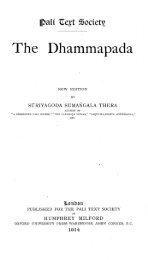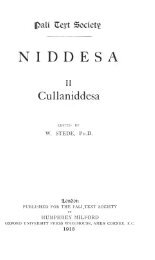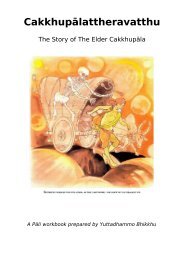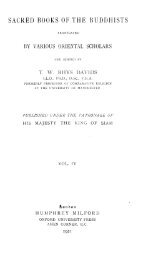Lessons In Practical Buddhism - Sirimangalo.Org
Lessons In Practical Buddhism - Sirimangalo.Org
Lessons In Practical Buddhism - Sirimangalo.Org
Create successful ePaper yourself
Turn your PDF publications into a flip-book with our unique Google optimized e-Paper software.
and more rubbish until it all begins to spill out in the form of<br />
evil thoughts, speech and deeds. New meditators are forced<br />
to see for the first time what all their craving and aversion<br />
have done to them, and they begin to realize for the first<br />
time why, in their endless pursuit for happiness, they never<br />
were truly happy for more than the briefest of moments.<br />
If one is wise, one will surely take such a realization as a<br />
blessing and make a steadfast effort to root out all of the<br />
unwholesome tendencies in one’s mind. It is important for<br />
new meditators to understand how seeing the nature of<br />
suffering and its cause clearly in this way is actually to their<br />
greatest benefit, otherwise they may become discouraged,<br />
afraid to look closer at that which they have avoided for so<br />
long – their own mind.<br />
Once we understand reality as it is, we will accept it as it is.<br />
We won’t wish for things to be other than what they are, for<br />
we will understand that such wishing is utterly useless. Once<br />
we see that the objects of our experience cannot possibly<br />
bring us true and lasting satisfaction no matter what we do,<br />
we will give up any concern for their appearance or<br />
disappearance, and live our lives in peace, happiness and<br />
freedom from suffering at all times, in any situation<br />
whatsoever. Once we are able to experience the full<br />
spectrum of reality objectively, without categorizing our<br />
experiences as good or bad, acceptable or unacceptable,<br />
then no experience will have the power to cause us even the<br />
smallest discomfort.<br />
The most direct method for seeing things as they are is<br />
taught by the Buddha in the Satipaṭṭhāna Sutta (MN 10), as<br />
in:<br />
‘gacchanto vā gacchāmīti pajānāti’<br />
“When walking, one fully comprehends: ‘I am walking’.”<br />
When something arises, we observe it objectively, seeing it<br />
for what it is, simply reminding ourselves in an objective<br />
manner that “it is what it is”. For example, when we feel<br />
pain, we simply remind ourselves that it is pain; not good,<br />
not bad, not me, not mine, simply “pain”. This is the<br />
32












